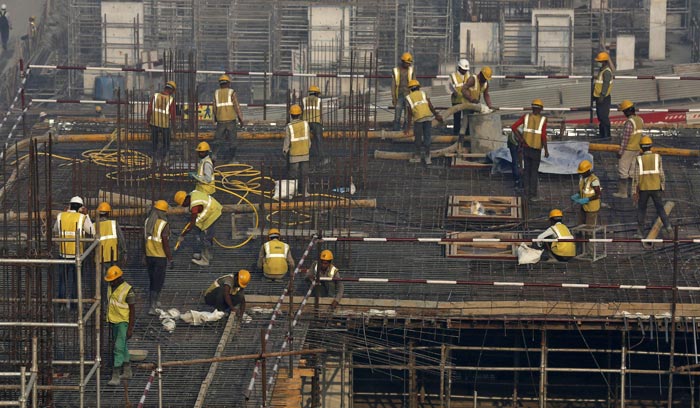Labourers work at the construction site of a residential complex in Mumbai on Friday. India's economy will grow at a rate of more than 8% in the 2015/16 fiscal year that will be covered by Finance Minister Arun Jaitley's budget on Saturday, a government economic report said.
Reuters/New Delhi
India can increase investment to drive economic growth without borrowing more, a key government report said on Friday, in an indication that Finance Minister Arun Jaitley will stick to debt targets in his maiden full-year budget on Saturday.
The Economic Survey, the basis for Jaitley's budget for the fiscal year starting April 1, forecast the economy would grow by 8.1-8.5% under a new calculation method that makes India the world's fastest-growing big economy. The forecasts mark acceleration from growth of 7.4% in the current fiscal year.
"India has reached a sweet spot and...there is a scope for Big Bang reforms now," the report said, adding India was on course to hit double-digit growth rates.
At first glance, the growth outlook looks impressive. But it follows a big overhaul of India's economic data, which previously showed the economy struggling to recover from its longest growth slowdown in a generation.
Other indicators of India's economy are not as rosy as GDP data suggests. Earnings of the country's top 100 companies shrunk by 6% in the last quarter, private investment and consumer demand are weak and merchandise exports are falling.
Prime Minister Narendra Modi won a landslide general election victory last May, capitalising on dissatisfaction among Indians over their economic lot and promising 'better days' of more jobs, investment and growth.
The report compiled by Arvind Subramanian, a renowned development economist lured away from a Washington think tank by Modi, suggested the economy was building momentum.
"A clear mandate for reform and a benign external environment now is expected to propel India on a double-digit trajectory," the Economic Survey said.
That, above all, reflects a near halving in international prices for oil, India's biggest import. As a result the report predicts the current account deficit would be below 1% of GDP in 2015/16, a far cry from figure of 4.7% in 2012/13 that preceded a currency crisis in India.
‘Statement of intent’
Jaitley's first interim budget last July was widely regarded as a flop and, hobbled by weak tax revenues, he has resorted to hurried sales of state assets late in the current fiscal year to make his budget numbers.
The government would not overshoot its deficit target of 4.1% of gross domestic product in the current fiscal year just ending, the report said, reiterating a medium-term target of cutting it to 3% of GDP.
Shifting spending from subsidies to investment will be the key to keeping the budget on track, giving a further lift to growth as Modi seeks to unblock billions of dollars in stalled investment projects.
"The economic survey is the government's statement of intent," said Ganti Murthy, head of fixed income at IDBI Asset Management in Mumbai.
Inflation is on a declining trend, the report also said, and is likely to undershoot the Reserve Bank of India's target of 6% by January 2016 by 0.5-1 percentage point.
That, the report said, should create room for the RBI to cut interest rates after it made a tentative, quarter-point cut in January. Governor Raghuram Rajan has made fiscal consolidation a precondition for further cuts in the RBI's main policy rate of 7.75%.

